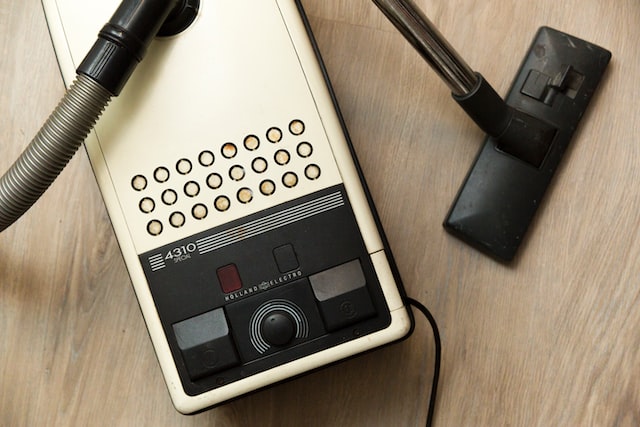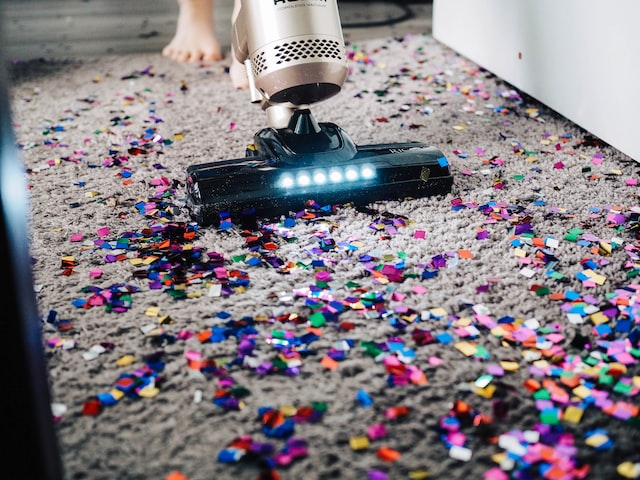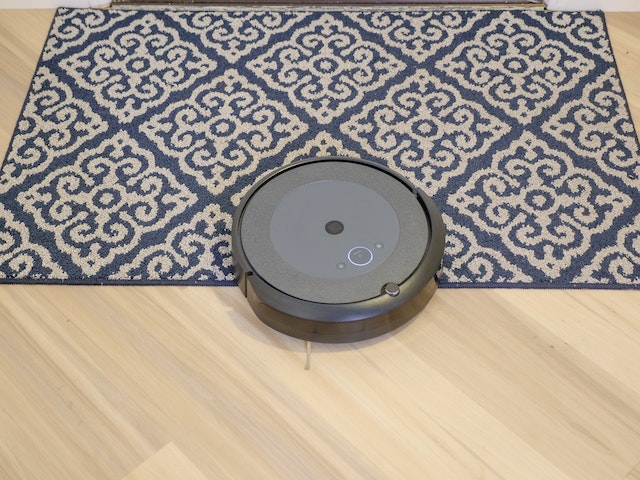It’s hardly a picnic to go vacuum shopping. Typically, we give much thought to the vacuum’s make, model, and suction power. However, durability should be a top priority when shopping for a replacement.
However, manufacturers don’t always disclose how long their vacuums will last. We can help with that. This post will tell you how long vacuums typically last. When you know how long a certain vacuum lasts, you can determine if it’s a good financial investment.
The Benefits of Vacuum Cleaners
Before discussing their lifespan, we need to mention some of the major advantages of vacuums. For starters, it boosts the productivity of the entire cleaning process. Instead of spending time and effort mopping, just run the vacuum over the surface and it will pick up any dirt, soil, or liquid left behind.
More powerful models from reputable vacuum brands may spin at up to 25,000 RPM, so it’s reasonable to expect a full house cleaning to take no more than an hour. Vacuuming is more effective than other cleaning methods in removing allergen-inducing dust, grime, and chemicals.
Vacuum cleaners not only help you save time and effort, but they also have positive effects on your physical and mental health. If you choose a high-quality vacuum cleaner from a reputable company like Shark, Dyson, or Hoover, it will endure for years and perform admirably without requiring any significant repairs.
How Long Different Vacuums Last and What Kinds There Are
Most vacuums should be replaced after around eight years. Naturally, some will run a year or two shorter, while others will go much longer. To help you choose the best vacuum for your needs, we’ll take a look at how long different models typically last.
1. Upright Vacuum
The upright vacuum is the largest and heaviest of the available vacuums and is widely regarded as the “original” vacuum design. It’s important not to look at things in a totally negative light. They might be cumbersome to stow away and transport, though.
However, they are usually made to last, so they have stronger suction and stronger construction. As a result, you can anticipate a long lifespan from an upright vacuum, perhaps eight years or more. They also typically have a cord attached. This eliminates any concerns about battery life.
2. Canister Vacuum
The suction and power of a canister vacuum are comparable to those of an upright model. Similar longevity of at least eight years can be expected. They are, nevertheless, seen as a more mobile choice. Due to this, they may not be as sturdy and could easily break under stress.
3. Stick Vacuum
The primary selling points of stick vacuums are their portability and adaptability. This facilitates their use in the domestic setting. However, they won’t have the longest lifespan of any vacuum. Furthermore, they are not made for scrubbing really dirty floors. In this vein, it’s possible that consumers place more faith in the most well-known names in the industry.
4. Robot Vacuum
The robotic vacuum is the most recent innovation in the vacuum industry. Everything about this runs automatically. If you’re constantly busy during the day, or if you just want to relax without worrying about vacuuming, a robot vacuum is a perfect solution.
However, they are not as sturdy as traditional upright vacuums. Since you aren’t controlling them directly, they may encounter greater difficulties as well. These automated sweeping machines run on batteries.
It’s possible you won’t be able to switch out the batteries if they’re integrated into the cleaner. A vacuum cleaner’s run time is directly proportional to the battery’s capacity. Some research suggests that lithium-ion batteries have a longer lifespan. However, we still estimate that the average lifespan of a robot vacuum is anywhere between three and five years.
5. Handheld

Finally, there’s a portable vacuum cleaner. These are portable and lightweight, perfect for usage around the house or in the car. The motor isn’t as strong as some alternatives, and they require batteries to operate. With proper maintenance, a portable vacuum can serve you for up to three years.
6. Central Vacuum Systems
The installation of central vacuum systems is comparable to that of central heating and air conditioning systems. Larger homes benefit greatly from central vacuum systems. When installed, all you need is a bendy hose to start using it as a vacuum, which can greatly reduce the effort involved in keeping your home clean.
With care, their usefulness can exceed 20 years, making them among the longest-lasting vacuum cleaners available. This is why they last so long. Most central vacuums have a single, big body for collecting dust and dirt. Depending on its shape, this transparent container could either be a purse or a suitcase. This component is typically hidden away in the basement or another less-frequented area of the house.
7. Backpack Vacuums
In order to clean more efficiently, some people prefer to use a cleaner that can be carried on their back, such as a backpack vacuum. In the event that they are purchased in the correct size for the wearer and are cared for appropriately, their lifespan is anywhere from five to eight years.
They are usually lightweight enough that they won’t put undue pressure on the user’s back and often serve as both a hoover and a blower. Companies that specialize in cleaning establishments like hotels and office buildings typically own, use, and operate such machines.
You can find them in any electronics specialty shop. A wide variety of backpack vacuums are readily available for purchase on the internet. Some still require an electrical outlet, but many modern devices can function on strong batteries.
They have a long reach, but the wearer may experience discomfort if they try to stoop down to vacuum hard-to-reach regions because of the weight of the pack.
8. Wet/Dry Shop Vacuums
A shop vac is a type of vacuum that may be used to remove both dry and wet debris without causing any harm to the engine or filter. Dry and wet vacuums, often known as shop vacuums, are big, rolling vacuum cleaners that can contain a lot of dust and dirt.
Wet/dry vacuums are built to survive for roughly ten years before they need to be replaced because of their high weight and sturdy design. That’s a lot of time spent operating while picking up dry and wet materials. They have the ability to remove liquids from a variety of surfaces, including carpets, hard floors, dry objects (such as flaking paint, and matted pet hair), and more.
These wet/dry vacuums are utilized by cleaners who want to accomplish two tasks at once. Wet-and-dry appliances, on the other hand, can withstand the wear and tear of having young children in the house who are prone to spilling both dry and wet foods. Filters, such as HEPA filters, are often attached to them.
How Longer a Vacuum Will Last and Its Contributing Factors
A vacuum’s longevity cannot be predicted with any certainty. Yet it is not completely random. Several more factors may impact your vacuum’s projected lifespan.
1. Associating Oneself With The Brand’s Name
There is a direct correlation between the vacuum cleaner’s quality and the manufacturer’s reputation. Brand names are typically superior to generic alternatives. There are always exceptions to any rule, but when comparing vacuums you have experience with to those you don’t, it’s helpful to use one as a reference.
Manufacturers of well-known vacuum brands have the financial wherewithal to obtain and employ components of the highest possible quality and durability. Even though it’s generally true that the electronics industry inflates prices after using inexpensive components to construct finished goods, there are always outliers. However, for the vast majority of well-known vacuum manufacturers, that won’t be a problem.
2. The Maintenance
It’s not common knowledge that everyone can keep their vacuum in tip-top shape. Nothing to be embarrassed by, although occasionally manufacturers do a terrible job of explaining to customers how to prolong the life of their products.
However, if the filters are regularly emptied, cleaned, and replaced, the motor will experience less wear and tear, allowing it to maintain a constant horsepower rating.
✱ Clean The Filters
Your vacuum filters will trap allergens, dust, bacteria, and smoke. So, it stands to reason that grime and obstructions will build up over time. Regular filter cleaning is required.
Many modern vacuums feature removable filters that may be cleaned and reused. Therefore, routine cleaning is essential. Once they become dirty with dirt and dust, simply rinse them under the sink.
Cleaning with water alone is all that’s needed; no harsh chemicals are required. Simply wipe them down and dry them before reassembling the vacuum. Growing mold and letting its spores spread through the air is something you want to avoid at all costs.
✱ Empty The Bag Or Dust Canister Regularly
Remember to empty your vacuum on a regular basis, whether it uses bags or not. If you let it full to the top and continue to vacuum around the house, the vacuum may become clogged. It will also diminish your cleaning abilities.
✱ Untangle The Brush
All of the dust, crumbs, curly, and carpet fibers are sucked up by the powered brush at the bottom of your vacuum. Among the most crucial vacuum parts, the brush is essential. However, as it gathers so much dirt, the dirt might encircle it, causing stress.
The motorized brush on your home’s cleaning equipment may not be able to spin as a result. Each couple of weeks, disassemble the electric brush and clean it with scissors to remove any buildup of hair and dirt.
3. The Usage

Vacuums have a finite lifespan that will decrease with increased use. More frequent use, especially in larger areas, will increase the machine’s wear and tear. The dirtier and filthy your floor and carpet are, the harder your vacuum will have to work to clean them.
However, improper use can also reduce your vacuum’s lifespan. Misuse includes things like picking the wrong type for your needs or failing to utilize the appropriate height adjustment on a carpet with a high pile.
✱ Cleaning up Liquids
Some models of handheld vacuums are made to quickly and easily remove small amounts of water from floors and carpets. Vacuuming effectively in both wet and dry conditions is a common feature of modern vacuum cleaners.
However, this is not the case with the majority of sticks, canisters, and upright vacuum cleaners. Liquids can cause serious damage to a vacuum cleaner. Doing this may lead to electrocuting yourself. Instead of using a standard vacuum for liquid cleanup, you should grab a mop or some paper towels.
✱ Being Careless with the Power Cord
It’s possible that the vacuum’s motorized brush might cut and shred the power cable if you don’t keep it away from the appliance. Over time, the exposed cables could make using your vacuum risky. Additionally, avoid yanking on the cord when attempting to vacuum.
✱ Not Tidying up First
The goal of finishing up all of the housework is one that we will understand. However, neglecting the cleaning phase could lead to mechanical failure of the vacuum. It’s easy to damage a vacuum cleaner with small things like coins and toys, but even screws and glass can cause problems. The motor or the bag are also included in this category.
How Long Do Vacuums Typically Last?
How long do most vacuum cleaners survive before needing to be replaced? This is highly conditional on the nature of the vacuum and the intended task. A Shark cleaner that is utilized daily to remove pet hair, as well as other debris from the home, may endure for ten years or more.
If you want to save money in the long run, consider purchasing a portable steam cleaner. But if the robot vacuum is regularly cleaning lengthy hair, its lifespan maybe half that or even shorter.
Expected Lifespan of Vacuums
The range of possible ages is rather large when considering longevity. If you maintain it properly and get a high-quality model, a vacuum cleaner should last for eight years or more. A vacuum model’s lifespan can be significantly lengthened with regular servicing.
If you’re concerned about your carbon footprint or your electric bill, you should also check the amp draw of your vacuum. Over the course of the vacuum’s lifetime, your energy expenditures could skyrocket if you choose a high-suction model. The lifespan of any given model of vacuum cleaner, be it a canister or an upright, will be roughly the same.
The range of possible ages is 5–8 years. Having a lifetime warranty, keeping up with routine maintenance, and not be hesitant to contact customer care when necessary can change this. Also, different vacuum models have varying expected lifespans. The lifespan of a high-end robot vacuum will typically exceed that of a stick vacuum.
How Do You Prolong Life Expectancy?

Now that we’ve shown that vacuum cleaners typically last for eight years, let’s talk about ways to extend that lifespan. Maintaining your vacuum on a regular basis will help it last longer than the manufacturer claims it would, regardless of the brand.
In order to prolong the life of your vacuum, you need to do more than just remove the dust bag or canister after each usage. The machine requires cleaning and the filters must be changed regularly.
Tip #01: Clean the Filter Regularly
Users may extend the life of the vacuum through regular filter cleaning. The filter’s effectiveness declines as it becomes unclean, necessitating replacement. You may clean the filter by taking it out of the vacuum and running water over it. Always wait until it’s entirely dry before replacing it in the vacuum.
Tip #02: Empty the Canister After Every Use
Never leave the canister in the vacuum, if you value its longevity. The vacuum needs to be cleaned as regularly as possible to prevent dust and debris from building up and causing harm.
Tip #03: Avoid Overheating
Some vacuums are particularly vulnerable to overheating. The motor and some other interior parts are at risk if the vacuum grows too hot. To avoid this, always let the vacuum cool down before putting it away.
Tip #04: Keep It Clean
A vacuum, like any other mechanical device, benefits from regular cleaning to extend its life. Always keep a rag or brush handy and use it to wipe off surfaces on a regular basis. Maintaining a clean environment around the machine will reduce the risk of it breaking down due to dust and dirt accumulation.
Tip #05: Replace Components When Necessary
As time goes on, you’ll need to replace some parts of the vacuum. The filter, conveyor belt, and can all be found here. Maintain a schedule for when these parts need to be changed and do so without delay. By adhering to these guidelines, you can extend the life of your vacuum cleaner.
Frequently Asked Questions:
Q: Are cordless vacuums as effective as corded ones?
In a nutshell, the answer is yes. However, the question remains as to whether or not their smaller capacity and shorter battery life are suitable for your home. If you have a larger space and prefer to clean it all in one go, you may find that a stick vacuum is not the best option. An intelligent substitute in this situation might be a cylinder vacuum.
You can clean your home just as effectively, if not better, with a stick vacuum than with a corded model if you adopt a more room-by-room technique and don’t take priority to unload the bag or replenish your batteries more frequently.
Q: Should I get a brand-new vacuum or something used?
It’s not always easy to decide whether to buy a brand-new or a previously owned vacuum cleaner. Investigate your finances and study reviews before making a purchase.
It’s usually more budget-friendly to have a secondhand vacuum instead of a brand-new one. Instead of purchasing a brand-new vacuum cleaner if you have a limited budget, think about doing so!
Q: Is there a specific time frame during which a vacuum cleaner should be replaced?
The maintenance and regular replacement of a vacuum cleaner might be a hassle. With that, it is important that you comply with these straightforward vacuum cleaner maintenance directions. Depending on the carpet’s durability and how regularly it’s vacuumed, the appliance could wear out in as little as three months. Before each cleaning, place your palm over the inlet pipe to ensure enough suction.
Keeping the filters clean will help your vacuum run at its best. The time and effort you save by keeping track of the vacuum parts that need replacing and when can be put to better use.
Q: What can we do to make sure that my vacuum cleaner lasts for as long as possible?
As they get older, vacuums gradually lose some of the suction force they once had. Both the filters and the engine have the potential to become clogged with debris and overheat. Maintaining your vacuum on a consistent basis and utilizing the correct accessories will allow you to get more use out of it and make it last longer.
Q: How Long Will a Vacuum Cleaner Last If It Isn’t Being Used?
When used often, a vacuum cleaner has a lifespan that can range anywhere from six months to two years.
Q: When was the time I should have my vacuum cleaner’s filters changed?
A vacuum’s filters need to be changed once every 6 months. That way, you may eliminate the odor of the vacuum cleaner.
Final Thoughts
A good vacuum cleaner typically lasts you between five years to twenty years or longer. Investing in a high-quality vacuum cleaner from a reputable company, like Shark or Dyson, will pay off in the long run by providing you with years of reliable service.
Don’t forget that routine upkeep is crucial to maximizing your vacuum’s performance and extending its lifespan. In most households, a vacuum cleaner is an absolute need, making it all the more important to pick the right one.

